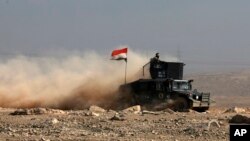Iraqi forces on Sunday pushed deeper into western Mosul, capturing two more city neighborhoods from Islamic State extremists as thousands of locals continued to flee toward government controlled sectors of the embattled city.
A full week into a renewed government offensive, witnesses and military commanders said the Iraqi force, backed by U.S.-led airpower, had liberated the districts and were focusing on extending and securing bridges across the Tigris River.
There were no immediate reports of casualties.
Iraqi Kurdish news reports from the scene said civilians continued to flee the contested districts in droves, with most of them bused to a refugee camp in eastern Mosul capable of holding 20,000 people. The Rudaw News report said nearly 4,000 people have fled the districts in the past 48 hours.
In peace time, western Mosul is home to 750,000 civilians. But Saturday, the United Nations described a humanitarian crisis in the vast area, with civilians facing severe shortages of food, fuel and medical supplies.
Many civilians under siege in western Mosul fled there after being forced from the eastern part of the city to avoid heavy fighting last month.
U.S. military assistance
U.S.-led coalition troops, officially deployed as trainers and advisers, have assisted the Iraqi force in the Mosul offensive, which began in November and extended last week into the city's heavily fortified western sectors.
Under a current bilateral agreement, U.S. forces are not authorized to engage in combat. But as the Mosul offensive gained strength last week, U.S. Air Force Colonel John Dorrian, said advisers were positioned so close to the frontlines that they had come under attack and returned fire.
Since the February 19 government push, U.S. and Iraqi commanders have described fierce Islamic State resistance, as the extremist force seeks to hold its last significant urban area in the war-ravaged country.
Slow advance
As the latest offensive unfolded, Iraqi expert Houchang Hassan-Yari of the Royal Military College of Canada warned VOA's Persian service that the density of the civilian population in western Mosul would slow the government advance.
Hassan-Yari noted that government forces and their coalition partners have imposed restrictions on firepower available to retake the western sectors "in order to save the lives of civilians."
Meanwhile, aid agencies are preparing for the possibility that up to 250,000 people might flee Mosul in the coming days or weeks.
The U.N. refugee agency has said it is focusing its efforts on building new camps to house the displaced. The United Nations High Commissioner for Refugees has completed eight camps and says it is planning to start work at another site south of Mosul.
Parisa Farhadi, Babak Azma and Sara Dehghan of the VOA Persian service contributed to this report.





